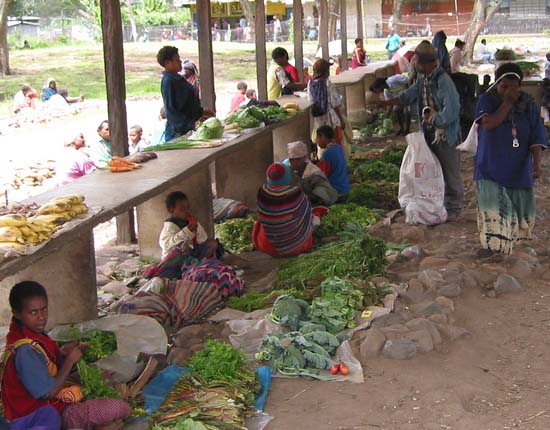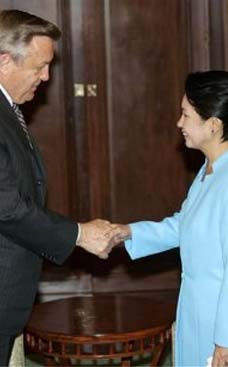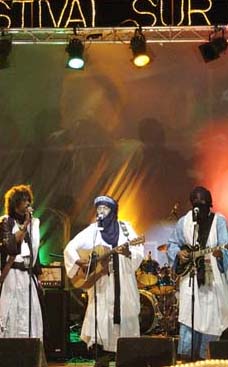2007.03.20: March 20, 2007: Headlines: COS - Papua New Guinea: Culture Shock: Women's Issues: Flickr: American Public Media: RPCV Skye Rhode writes: Economic opportunities for women in Papua New Guinea are changing those traditional gender roles
Peace Corps Online:
Directory:
Papua New Guinea:
Peace Corps Papua New Guinea :
The Peace Corps in Papua New Guinea:
2007.03.20: March 20, 2007: Headlines: COS - Papua New Guinea: Culture Shock: Women's Issues: Flickr: American Public Media: RPCV Skye Rhode writes: Economic opportunities for women in Papua New Guinea are changing those traditional gender roles
RPCV Skye Rhode writes: Economic opportunities for women in Papua New Guinea are changing those traditional gender roles

I'm amazed by the strength of these women. They carry 80-pound bags of kaukau, or sweet potato, on their heads and backs. They work all day long cleaning, cooking, gardening, selling vegetables at the market, and then they weave string bags called bilums whenever they aren't doing anything else. But things are changing. Women are becoming more empowered. I'm not just talking about more women wearing trousers, which they are, or more women driving, which they are. Today, 20 percent of Papua New Guineans work as teachers, as housecleaners, in stores and businesses. Many of them are women. Even with improved access to education and more job opportunities outside the village, the women of Papua New Guinea teeter between the clearly defined gender roles of the past and the thrilling — and overwhelming — position of having choices for the first time.
RPCV Skye Rhode writes: Economic opportunities for women in Papua New Guinea are changing those traditional gender roles
Breaking with tradition
Caption: Kainantu Market Prime Spots Photo: kahunapulej Flickr Creative Commons Attribution-NonCommercial-ShareAlike 2.0
Listen to this story
An estimated 70% of Papua New Guinea's population lives in poverty. Men have mostly been the wage earners. But economic opportunities for women are changing traditional gender roles. Skye Rhode reports.
TEXT OF STORY
KAI RYSSDAL: The country of Papua New Guinea shares half the island of New Guinea, near Indonesia in the South Pacific ocean. It exports gold, oil and timber to drive its economy. There are plentiful fisheries, too. But still the World Bank estimates 70 percent of the population lives in poverty. Almost half on less than a dollar a day.
Men have mostly been the wage-earners. But Skye Rohde reports economic opportunities for women are changing those traditional gender roles.
SKYE ROHDE: The first time I set foot in Papua New Guinea, I was a new Peace Corps volunteer. It was January 1999, in the capital city, Port Moresby. I was so scared of offending anyone that I managed to do it anyway: the edge of my skirt blew over the betel nuts on a woman's tarp at a makeshift market. The woman glared at me. I apologized: sori, sori. But what I did was taboo: a woman who steps over something pollutes it.
Unspoken rules like these have been around far longer than the national government, or even the Christian missionaries. The people of New Guinea have been subsistence farmers for generations. Almost everything they eat, they grow themselves in immense gardens.
Their gender roles were clearly defined out of necessity, says Moses Venapoe. He runs a microfinance organization in the city of Goroka. His family housed me during my Peace Corps training, and again when I went back to visit last September.
MOSES VENAPOE: The women in the house, they do cooking, washing clothes as well as doing the dishes. They look after the children as well. But men, normally we go out, look for food.
Though the man is seen as the breadwinner, the woman has always been the engine of the household.
It's not a glamorous life by any means, says Janet. She's from Kabiufa Village, 10 kilometers outside Goroka.
"Life is hard here," Janet says. "I sleep and wake up and think about going to my garden. Now I've finished working in the garden, I'm finding some food and I'm coming back. After this, I'll go down to the market and find some money to buy a little salt."
I'm amazed by the strength of these women. They carry 80-pound bags of kaukau, or sweet potato, on their heads and backs. They work all day long cleaning, cooking, gardening, selling vegetables at the market, and then they weave string bags called bilums whenever they aren't doing anything else.
But things are changing. Women are becoming more empowered. I'm not just talking about more women wearing trousers, which they are, or more women driving, which they are. Today, 20 percent of Papua New Guineans work as teachers, as housecleaners, in stores and businesses. Many of them are women.
Thirty-three-year-old Josephine Ketawa works at the telephone company Telikom. She's also taken out a loan to build her own house in her parents' village. That's unheard of for single women. Josephine says her extended family has mixed feelings.
JOSEPHINE KETAWA: They're happy, they're proud of me. And at the same time, the men are ashamed. Especially the young boys. They think they should be the ones doing it before me.
Moses Venapoe's wife, Delta, works with him dispersing small loans at MV Microfinance.
DELTA VENAPOE: Most of the ladies that we give loans are single mothers. And I ask them why, and they said, 'Oh, the men, they think that they are hero. When they see that we are getting old, they want a young girl. Like we can be a breadwinner for the home; we don't need the men.
"We don't need the men." That's something I never even heard mentioned in 1999.
The ladies use these loans to pay for food or their kids' school fees. But education is also an enormous challenge for the women themselves.
Down the road in Ifiufa Village, Kathy Giapo runs the four-year-old Ifiufa Women's Resource Center, which operates 18 literacy schools. She estimates that only 5 percent of women in the village can read and write.
She's doing what she can to enroll more women in the schools.
KATHY GIAPO: Most of them are already writing. They can read and say ABC to zed, and count the numbers, 1 to 100. So at least they are doing something. And they are well off. And they are very happy with this project.
Even with improved access to education and more job opportunities outside the village, the women of Papua New Guinea teeter between the clearly defined gender roles of the past and the thrilling — and overwhelming — position of having choices for the first time.
In Papua New Guinea, I'm Skye Rohde for Marketplace.
RYSSDAL: Skye's story comes to us by way of the radio collective Hearing Voices.
Links to Related Topics (Tags):
Headlines: March, 2007; Peace Corps Papua New Guinea; Directory of Papua New Guinea RPCVs; Messages and Announcements for Papua New Guinea RPCVs; Culture Shock; Women's Issues; Creative Commons
When this story was posted in May 2007, this was on the front page of PCOL:





Peace Corps Online The Independent News Forum serving Returned Peace Corps Volunteers
 | PCOL serves half million
PCOL's readership for April exceeded 525,000 visitors - a 50% increase over last year. This year also saw the advent of a new web site: Peace Corps News that together with the Peace Corps Library and History of the Peace Corps serve 17,000 RPCVs, Staff, and Friends of the Peace Corps every day. Thanks for making PCOL your source of news for the Peace Corps community. Read more. |
 | Suspect confesses in murder of PCV
Search parties in the Philippines discovered the body of Peace Corps Volunteer Julia Campbell near Barangay Batad, Banaue town on April 17. Director Tschetter expressed his sorrow at learning the news. “Julia was a proud member of the Peace Corps family, and she contributed greatly to the lives of Filipino citizens in Donsol, Sorsogon, where she served,” he said. Latest: Suspect Juan Duntugan admits to killing Campbell. Leave your thoughts and condolences . |
 | Warren Wiggins: Architect of the Peace Corps
Warren Wiggins, who died at 84 on April 13, became one of the architects of the Peace Corps in 1961 when his paper, "A Towering Task," landed in the lap of Sargent Shriver, just as Shriver was trying to figure out how to turn the Peace Corps into a working federal department. Shriver was electrified by the treatise, which urged the agency to act boldly. Read Mr. Wiggins' obituary and biography, take an opportunity to read the original document that shaped the Peace Corps' mission, and read John Coyne's special issue commemorating "A Towering Task." |
 | Chris Dodd's Vision for the Peace Corps
Senator Chris Dodd (RPCV Dominican Republic) spoke at the ceremony for this year's Shriver Award and elaborated on issues he raised at Ron Tschetter's hearings. Dodd plans to introduce legislation that may include: setting aside a portion of Peace Corps' budget as seed money for demonstration projects and third goal activities (after adjusting the annual budget upward to accommodate the added expense), more volunteer input into Peace Corps operations, removing medical, healthcare and tax impediments that discourage older volunteers, providing more transparency in the medical screening and appeals process, a more comprehensive health safety net for recently-returned volunteers, and authorizing volunteers to accept, under certain circumstances, private donations to support their development projects. He plans to circulate draft legislation for review to members of the Peace Corps community and welcomes RPCV comments. |
 | He served with honor
One year ago, Staff Sgt. Robert J. Paul (RPCV Kenya) carried on an ongoing dialog on this website on the military and the peace corps and his role as a member of a Civil Affairs Team in Iraq and Afghanistan. We have just received a report that Sargeant Paul has been killed by a car bomb in Kabul. Words cannot express our feeling of loss for this tremendous injury to the entire RPCV community. Most of us didn't know him personally but we knew him from his words. Our thoughts go out to his family and friends. He was one of ours and he served with honor. |
 | Peace Corps' Screening and Medical Clearance
The purpose of Peace Corps' screening and medical clearance process is to ensure safe accommodation for applicants and minimize undue risk exposure for volunteers to allow PCVS to complete their service without compromising their entry health status. To further these goals, PCOL has obtained a copy of the Peace Corps Screening Guidelines Manual through the Freedom of Information Act (FOIA) and has posted it in the "Peace Corps Library." Applicants and Medical Professionals (especially those who have already served as volunteers) are urged to review the guidelines and leave their comments and suggestions. Then read the story of one RPCV's journey through medical screening and his suggestions for changes to the process. |
 | The Peace Corps is "fashionable" again
The LA Times says that "the Peace Corps is booming again and "It's hard to know exactly what's behind the resurgence." PCOL Comment: Since the founding of the Peace Corps 45 years ago, Americans have answered Kennedy's call: "Ask not what your country can do for you--ask what you can do for your country. My fellow citizens of the world: ask not what America will do for you, but what together we can do for the freedom of man." Over 182,000 have served. Another 200,000 have applied and been unable to serve because of lack of Congressional funding. The Peace Corps has never gone out of fashion. It's Congress that hasn't been keeping pace. |
 | PCOL readership increases 100%
Monthly readership on "Peace Corps Online" has increased in the past twelve months to 350,000 visitors - over eleven thousand every day - a 100% increase since this time last year. Thanks again, RPCVs and Friends of the Peace Corps, for making PCOL your source of information for the Peace Corps community. And thanks for supporting the Peace Corps Library and History of the Peace Corps. Stay tuned, the best is yet to come. |
 | History of the Peace Corps
PCOL is proud to announce that Phase One of the "History of the Peace Corps" is now available online. This installment includes over 5,000 pages of primary source documents from the archives of the Peace Corps including every issue of "Peace Corps News," "Peace Corps Times," "Peace Corps Volunteer," "Action Update," and every annual report of the Peace Corps to Congress since 1961. "Ask Not" is an ongoing project. Read how you can help. |
Read the stories and leave your comments.

Some postings on Peace Corps Online are provided to the individual members of this group without permission of the copyright owner for the non-profit purposes of criticism, comment, education, scholarship, and research under the "Fair Use" provisions of U.S. Government copyright laws and they may not be distributed further without permission of the copyright owner. Peace Corps Online does not vouch for the accuracy of the content of the postings, which is the sole responsibility of the copyright holder.
Story Source: American Public Media
This story has been posted in the following forums: : Headlines; COS - Papua New Guinea; Culture Shock; Women's Issues; Flickr
PCOL37443
69




















